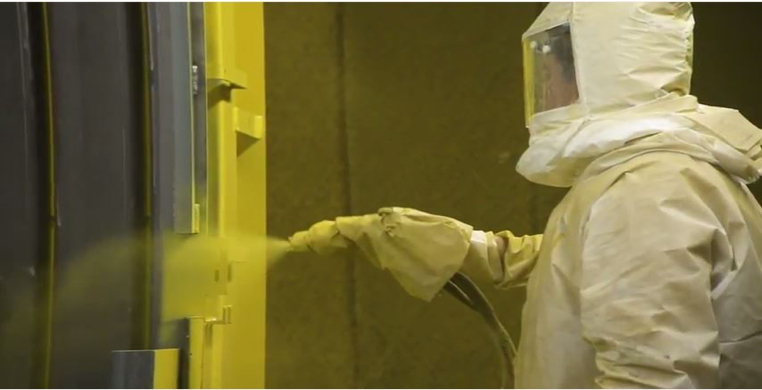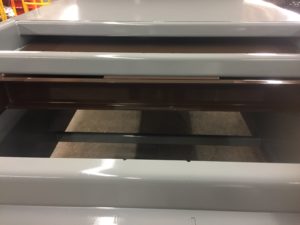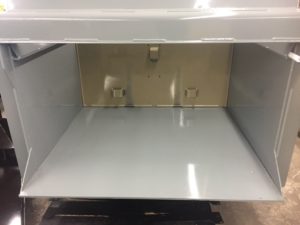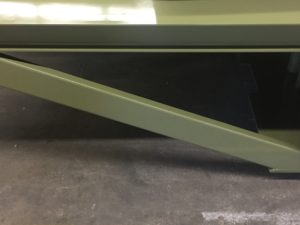Paint is an important commodity that adds lasting aesthetic and protective value to almost every product we use in our daily lives. With all of the visible benefits that coating products with paint provides, many people and manufacturers are blind to the problems created with working with paint and its proper disposal. Many forget about recycling paint.
Paint fumes and gases play a large role in the reduction of the ozone layer. As much as 5% of annual greenhouse gases released into the environment can be attributed to paint fumes. Just as importantly, paint that is disposed of improperly poses a health risk and environmental hazard due to its toxicity. Many paints can contain the toxic chemicals of cadmium, colbalt, magnesium, and lead. It is highly recommended that individuals and companies take steps to make sure their paint containers are empty and dry before adding them to the waste stream. Better yet, find ways for recycling paint as an alternative to disposing of the used paint.
What can you do to help with keeping unused paint out of the waste stream? Here are some used paint disposal alternatives.
Ideas for Reusing or Recycling Paint
(from the “Used Paint Disposal Alternatives” by the Environmental Protection Agency)
- Use up all of your paint. If you have a little left in the container, add more to your paint project for additional protection. The color will match perfectly and disposal will no longer be an issue.
- Find other immediate uses for the paint. If you are painting a wall, what about an old chair or stool that needs to be refurbished? Be creative!
- Donate leftover paint to churches, schools, theaters, or civic organizations.
- Store leftover paint in a climate controlled place for touch ups or use on a later date.
- If you cannot find another use for leftover paint, or you do not have a place to store it, use an absorbent material to help dry out the product. Kitty litter, sawdust, paper towels, etc., are all items that can help to dry out the container and help with proper disposal.
Paint Recycling for Manufacturers & Business
In manufacturing, quality paint and painting processes add significant shelf life to metal and wood parts. One of the most important benefits of painting metal is corrosion resistance. Paint helps to slow down rusting and pitting of metals like iron and steel.
 Paint also helps to reinforce company branding of product lines. People can’t resist associating quality products with a certain color. Whether it is John Deere green, IH Case red, Harley Davidson black and orange, or Harmony yellow, color does matter with product branding. These identifiers are synonymous with durability, affordability, satisfaction, and value.
Paint also helps to reinforce company branding of product lines. People can’t resist associating quality products with a certain color. Whether it is John Deere green, IH Case red, Harley Davidson black and orange, or Harmony yellow, color does matter with product branding. These identifiers are synonymous with durability, affordability, satisfaction, and value.
Some of the financial problems that manufacturers encounter with paint disposal are the wasted inventory of unused paint and the related costs of hazardous waste removal. It is often difficult to plan for the exact amount of paint to use in a specific production flow on a given day.
This problem becomes more difficult when DTM (direct to metal) paints are hardened with a catalyst for a quicker drying time. Most DTM paints that are hardened have a pot life of only 4-6 hours. Floor personnel are truly “on the clock” to find unique uses for extra paint or are forced to dispose of it.
A Colorful Solution to Paint Waste & Disposal
Harmony Enterprises, a global solutions provider in waste and recycling, has recently addressed this very problem associated with paint waste and disposal. Instead of throwing out excess paint used on their quality balers and compactors, they are recycling their “leftovers”, finding clever uses for it on outdoor compactor platens. These hydraulic rams are not visible to the public, but do require paint coating for protection.
Now, instead of utilizing new paint, Harmony is recycling paint by using up their remaining DTM paints from other areas of their machinery to create colorful and unique looking patterns on these platens.



This process not only saves Harmony time and money, but recycling paint in this way allows the environmentally-conscious manufacturer to reduce its overall waste footprint. With this new process, Harmony continues to live its belief in creating a beautiful, more sustainable environment for generations to come.
If you would like to learn more about Harmony’s innovative products and services, or about how we care about our community and global environment, please contact us here or call us today at (507) 886-6666.
Contact Harmony
